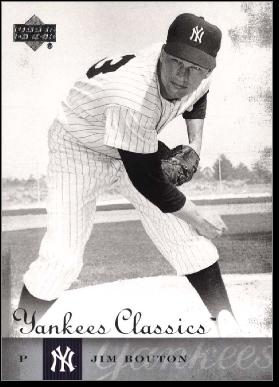
Sport: Baseball
Born: March 8, 1939
Died: July 10, 2019
Towns: Ridgewood & Rochelle Park, New Jersey
James Alan Bouton was born March 8, 1939, in Newark and grew up with his two younger brothers in Rochelle Park and Ridgewood, NJ. A Giants baseball fan, he would take the bus across the George Washington Bridge to watch his team play at the Polo Grounds. Jim was not a natural athlete, but his bulldog mentality enabled him to compete against more talented schoolmates. A growth spurt in high school gave him the strength and size he needed to become a good athlete. By this time, the family had moved to Chicago Heights. Jim became a standout pitcher for Bloom Township High School, and in the summers played American Legion ball.
Jim did not have an overpowering fastball, but he was an expert tinkerer who could control a number of other pitches, including a curve and knuckleball. He enrolled at Western Michigan University, joined the baseball team, and earned a scholarship after impressing the coach. In the summer of 1958, while pitching in a Chicago amateur league, he started drawing the attention of pro scouts. The Yankees ended up signing him for a $30,000 bonus.
Jim worked his way through the minors and made the Yankees in 1962. He had been assigned number 56 when he arrived at Spring Training—a number given to players with little chance of making the club. He wore 56 throughout his big-league career. In Jim’s first start, he allowed seven hits and seven walks, but managed to wriggle out of trouble and pitched a shutout. His toughness impressed the Yankee veterans and, at least for a while, it helped them overlook his off-beat approach to being a major leaguer.
Jim was drafted later in 1962 and served a six-month stint in the military. When he returned to the Yankees, he looked like a different pitcher. He hurled the baseball with tremendous force, often losing his cap in the process. Jim went 21–7 and was selected to pitch in the 1963 All-Star Game. The Yankees won the pennant and Jim faced Don Drysdale of the Dodgers in Game 3. They engaged in a memorable duel which, unfortunately ended 1–0 in LA’s favor. Jim won 18 games in 1964, as the Yankees captured their fifth straight pennant. He won Game 3 and Game 6 against the Cardinals in the World Series, but the Yankees fell in seven games.
What looked like a bright future began to dim in 1965, when Jim tried to pitch through an arm injury. He never fully recovered. In 1966, he threw the ball better, but the once-mighty Yankee offense was dreadful, and he posted a losing record for the second straight year. In 1967, Jim was relegated to the minors. While working his way back to the big leagues, he agreed to keep an account of his odyssey for Sport Magazine. This led to the groundbreaking book Ball Four, published after the 1969 season.
By then, Jim had been banished from the Bronx. He had played for the expansion Seattle Pilots and Houston Astros. After a poor 1970 season, Jim retired from baseball to pursue a new career as an author and baseball personality. His revelations in Ball Four made success in these roles problematic, as the sport’s establishment aligned against him.
Although baseball had given up on Jim, Jim never gave up on baseball. He played in amateur leagues in New Jersey and continually worked on his knuckleball. In 1977, at the age of 38, he played for teams in the minors and Mexican League. In 1978, he impressed Braves owner Ted Turner in Spring Training, earning a contract with Atlanta’s farm team in Savannah. After winning 11 games, he was called up to the Braves in September. In his first big-league game in eight years, he beat the Reds, 4–1. He announced his retirement after the season, claiming he had reached his goal.
Jim continued writing and speaking, and got involved with some business ventures, including Big League Chew bubble gum. The changes he ushered into the culture of baseball by writing Ball Four are evident every day, from the high level of journalism in the sport to the willingness of ballplayers to speak their minds.
In 2012, Jim suffered a stroke, which impaired his speech and memory. He passed away in Massachusetts seven years later at the age of 80.